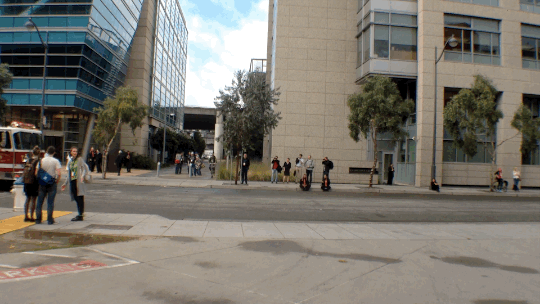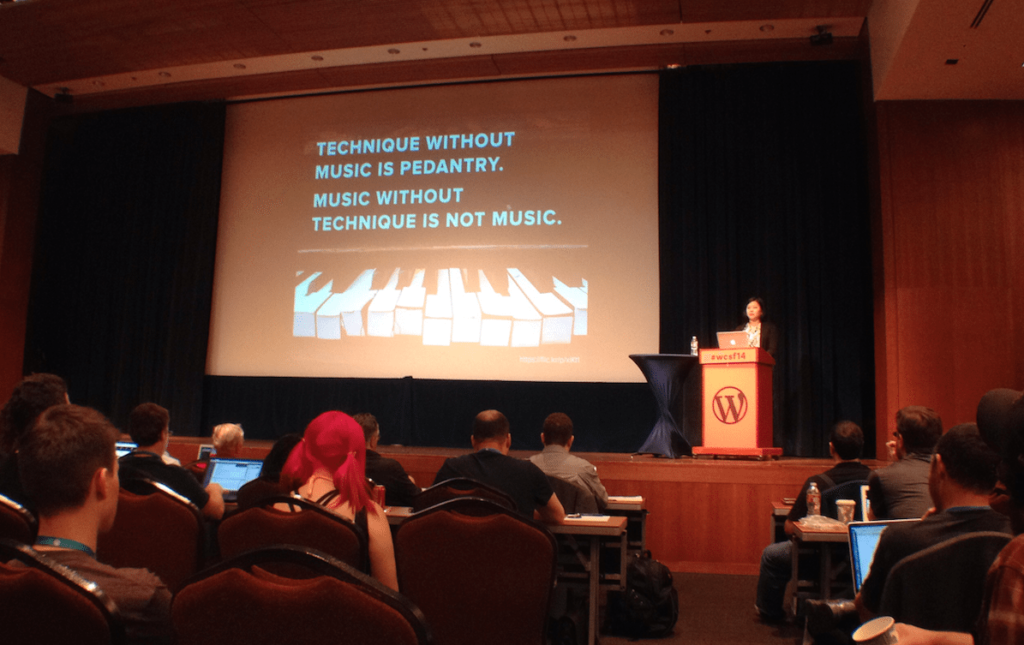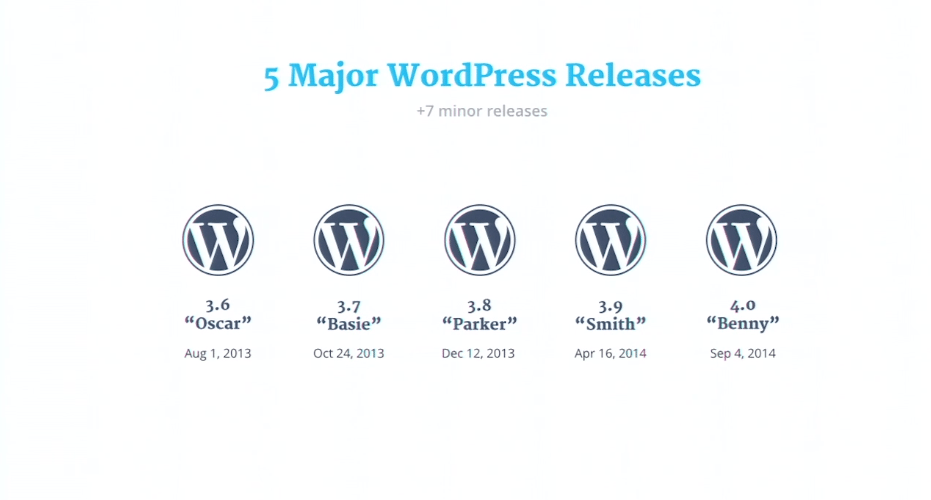Over the weekend, more than a thousand WordPress developers, professionals, and enthusiasts came together to attend the much-anticipated WordCamp San Francisco.
The WordPress-centric event kicked off to a somewhat alarming start. . . Literally, the early morning talks were interrupted by a fire alarm, which resulted in some impromptu socializing on the sidewalks.
The rest of the weekend unfolded quite perfectly, with a jam-packed venue, an exciting afterparty, and lots and lots of swag. Seriously though, I went home with 12 t-shirts.
Let’s take a look at some of the highlights from WCSF14!
WordPress Global
Many of the sessions at WCSF14 spoke to a greater message of globalization. Several speakers highlighted how WordPress makes a difference in the lives of people across the world, and reiterated the goal of WordPress as the democratization of publishing for all.
How WordPress Saves Lives
Paul Clark gave a powerful talk entitled “How WordPress Saves Lives & Moves Governments.” He illustrated the capability of WordPress through a real life example of how it empowered local people in the jungle of Burma to write about human rights violations in their country. It helped them find their voice, which subsequently gained a great deal of public attention.
In this instance, WordPress helped shed light on an important issue that would have otherwise gone unnoticed.
The Future of WordPress is Global
In Andrew Nacin’s talk, “The Future of WordPress is Global,” he emphasized the expansion of WordPress’ userbase across the world. He reminded us that WordPress 4.0 is fully translated to 41 different languages, and 4.1 is slated to enable users to easily switch to new languages on existing sites. You’ll also be able to search for plugins in your respective language, Nacin noted.
This is a very big step towards making WordPress more globally inclusive. Nacin acknowledged how far WordPress has come, but emphasized that there’s still a long journey ahead of us.
Code is Poetry: A Musician’s Tale
Helen Hou-Sandi spoke on a different language: music.
She quite eloquently explained how “music, like code, is a structured language.” Through her personal journey, Hou-Sandi reflected on her transition from pianist to developer. She explained how the skills honed as a musician translated perfectly as she joined in the development of WordPress.
While many of the sessions focused on languages across the world, Hou-Sandi’s talk provided perspective on a different type of language — which I personally found to be relatable, authentic, and interesting.
State of the Word
Matt Mullenweg started off the State of the Word announcing that this is the last year WCSF will be held at the Mission Bay Conference Center. After seven years, it no longer has the capacity to comfortably house all of the attendees and exhibitors.
Mullenweg subsequently announced that, after much deliberation, there will officially be a WordCamp US — though a confirmed name, date, and location are still undetermined.
Survey Results
Mullenweg announced that this year, for the first time ever, non-english downloads have surpassed english downloads. He indicated that the usages of WordPress as a CMS is on the decline, though WordPress as an app framework is on the rise.
Since the last WordCamp San Francisco, there have been five major releases of WordPress, with a whopping 785 contributors. In addition, this year the plugin repository has reached 1 million commits, and there are now 2,781 themes in the repository.
Internationalization
Internationalization is on its way, as highlighted in many of the other sessions at WCSF. Mullenweg announced that language packs will be coming to plugins and themes in early 2015, and that a fully localized plugin and theme directory on all language subdomains is slated to be included in the dashboard of 4.1.
Because plugins and themes are a very large part of what makes WordPress so desirable, providing localized searches will increase the discoverability of plugins and themes. Users can simply type their search in the dashboard, and get the list of localized plugins, with descriptions, support and more displayed in the respective language.
Automatic Updates and PHP
Mullenweg released shocking statistics indicating that only 25% of WordPress sites are operating on the latest version. He suggested we remove updates entirely from the conversation, and that updates will occur automatically.
On the topic of PHP, Mullenweg stated that “we’re going to be using relationships with hosts to get everyone on PHP 5 and above.”
Slack
Mullenweg announced that WordPress is leaving IRC, and going to adopt a new tool, called Slack, a San Francisco-based platform for enhanced team communication.
WordCamps Cultivate Community
While sessions provide direct insight into the current, and future state of WordPress, WordCamps also provide an excellent opportunity to interact with the community. WordCamps allow people who have worked, collaborated, or engaged with one another to meet face to face — often for the first time.
Within the WordPress space, it isn’t uncommon for companies have teams distributed across the country (and even the world). WordCamps are an opportunity for colleagues to come together for some quality face-to-face interactions.
I personally had privilege of meeting several virtual acquaintances in person for the first time. For me, those interactions were invaluable.
Did you attend WordCamp San Francisco? What was your favorite part?




No Comments